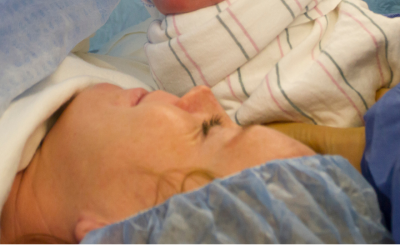
Could planned delivery help reduce at-term preeclampsia?
Preeclampsia Prevention by Timed Birth at Term
In this study, researchers looked at different ways to find out if a pregnant woman might get preeclampsia at term (>37 weeks) and when would be the best time to give birth to prevent it. There is currently no effective strategy for prevention of term preeclampsia.
Researchers studied data from two hospitals in the United Kingdom and looked at combinations of preeclampsia screening approaches as well as timed birth strategies to prevent term preeclampsia. The study found that the best time to screen for preeclampsia is around 35 to 36 weeks of pregnancy to prevent most cases of term preeclampsia. When clinicians delivered at 37 weeks, they studied screening methods that examined the level of risk per individual.
Despite some pushback based on the fact that delivery before term has a higher likelihood of risks for both the birthing patient and baby, this analysis found that screening for the individual risk of preeclampsia around 35 to 36 weeks can reduce the risk of getting term preeclampsia.
Take Home Message: Planned delivery at term (37 weeks) may be an intervention worthy of consideration in women at high-risk for preeclampsia. While this study does not change current care practices here in the US, it does open the way for further research on the topic of timed delivery to prevent preeclampsia.
Link: https://www.ahajournals.org/doi/full/10.1161/HYPERTENSIONAHA.122.20565
Citation: Magee LA, Wright D, et al. "Preeclampsia Prevention by Timed Birth at Term." Hypertension. Vol 80:969–978 (2023). https://doi.org/10.1161/HYPERTENSIONAHA.122.20565
ABOUT RESEARCH ROUNDUP
Each quarter, our team of science writers reviews the most current research studies related to hypertensive disorders of pregnancy and summarizes those studies of greatest interest and potential impact to our community, including research studies related to risk assessment, diagnosis, prevention, and treatment. Special thanks to our volunteer research team, who under the leadership of Dr. Elizabeth Sutton, make Research Roundup possible, and to our Patient Advisory Council, who reviews these materials from the patient perspective.
Related Articles

Your story is needed to improve outcomes for moms like you. Add your voice to critical preeclampsia research to ensure that every story is heard.

Frequently asked questions about the Preeclampsia Registry, a patient-driven registry and biobank.

The Preeclampsia Foundation offers research funding, study recruitment, and other patient engagement services to researchers.

We provide research grant funding to advance progress towards detection, prevention, or treatment of preeclampsia, HELLP syndrome, and other hypertensive disorders of pregnancy.

Recent findings in preeclampsia research have shown that preeclampsia likely has at least two variants – an early onset and a late onset variant. Early onset is typically defined as before 34 we...

Preeclampsia is a pregnancy complication marked by new-onset high blood pressure and signs of stress on organs such as the kidneys, liver, and brain. While much attention is often given to preterm dis...

Preeclampsia is a serious problem that can happen during pregnancy. It often affects the brain and can cause headaches, vision problems, strong reflexes, and seizures (called eclampsia). In this study...

Pregnancy offers a unique window into a woman’s future heart and cardiovascular health. Conditions such as hypertensive disorders of pregnancy (HDP) which include gestational hypertension, preec...

Heart disease, also called cardiovascular disease (CVD), is becoming more common in young women across the United States. Hypertensive disorders of pregnancy (HDP) is a group of conditions that includ...



